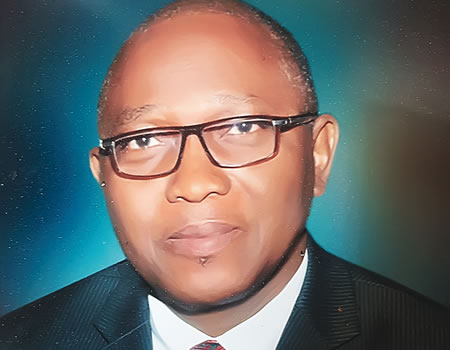
The Chief Medical Director, Professor Chris Bode, in this interview, explains how the Lagos University Teaching Hospital (LUTH) at Idi Araba, Lagos, is coping with increasing demand of Nigerians for quality health services against its overstretched physical and human resources.
Last Sunday, a victim of hit-and-run commuter bus reportedly died at the gate of this hospital. Can you put this story in its proper context?
Any death is an unfortunate situation but this particular case was also seemingly difficult to prevent as at the time we encountered the victim who has been identified as Mr. Segun Ogunjobi, a 24-year old man. No, I should say, he did not die at our gate and no, he was not left unattended to in LUTH. The true story was that he was seen, registered and promptly treated. Our records show that he was brought into LUTH at 6:43pm on Sunday, 2nd September, in a public vehicle upon referral from Navy Hospital, Ojo. Information at our disposal indicated that he was hit by a commercial vehicle. He was brought to LUTH from LASUTH where he was initially referred from Navy Hospital, Ojo. Our findings indicated that the victim did not receive any form of initial resuscitation at the hospitals of first and second call after the accident.
An assessment of moderate traumatic brain injury was made by the attending Triage Doctor who saw him within five minutes of arrival. Staff on duty said resuscitation was immediately commenced even while he was in the vehicle with intravenous fluids administered through two venous accesses sited on arrival in LUTH.
ALSO READ: Men send pictures of their manhood to me to examine — Angel Christopher
It is true that the victim could not be provided a bed immediately as the emergency centre was at full bed capacity. This was explained in detail to the relatives. Also the neurosurgical team was informed about his case and a computerized axial tomography (CAT-scan) was requested to determine the extent of his brain injury following review by the consultant in the Triage Unit. His family, however, could not provide funds for the CT-scan.
Meanwhile, the A&E Unit continued to make arrangements to provide a bed space in the centre while resuscitative effort was ongoing. Reports indicate that the family continued to delay in ensuring a CT scan. Our team continued to monitor his level of consciousness. Eventually, a bed was provided following the transfer of another patient to the theatre for emergency surgery. Some 90 minutes after arrival, his level of consciousness depreciated and attempts at cardiopulmonary resuscitation was not successful.
Let me emphasise that, unlike at the other centres where he had been taken to following the accident, LUTH did all that was possible within the constraints of our environment. We didn’t abandon him on account of lack of bed space. He was admitted and was being actively resuscitated by our teams of emergency doctors and neurosurgeons till he passed on. I also need to state here that we continue daily to stretch our manpower and material resources to ensure that as many citizens of this country that require emergency care are provided with compassionate care. This particular case was a bad one before he got to our centre for intervention. His care, which should have commenced several hours since injury, was delayed till he got to LUTH very late.
With just 500 beds and in a city harboring over 8 million people, with a majority depending on government health care services, how are you coping with the pressure?
With population growth, pressure and time, the attrition of ‘wear and tear’ on facilities in use will overstretch their capacities, especially in view of decades of usage in attending to Nigerians who daily throng LUTH for minor and tertiary medical cases. No doubt, it has been a herculean experience for us. In spite of this, we are responding to mitigate the consequences of huge hospital attendance and we will keep improving as our funding improves. For instance, the institution has commenced a hospital-wide renewal of its 56-year old ward blocks, starting with the B-Block. Expectedly, withdrawing a block of 120 beds from service has created some bed constraints, but we have continued to do our best in the circumstance by ensuring that nobody is sent away; and on rare occasions, we arrange with the Lagos State University Teaching Hospital to accommodate such patients in line with world’s best standard practice.
Will you rightly ascribe the situation to inadequate funding by government or manpower shortage or both?
Truly, the government cannot solely be responsible for funding the health sector, even when huge resources are being massively invested in the sector. This informed the ingenuity of the management at LUTH to embrace the Public Private Partnership – PPP- arrangement to provide some projects with direct impact on services and the patients, in line with what government encourages us to do now. For instance, out of the N60.9 million appropriated for LUTH in 2015, only N30 million was released for the year; in 2016, we got N83.9 million out of the N130.3 million budgeted and in 2017, the total release was N161.3 million of the N322.7million appropriated. So it is understandable why alternative sources must be explored to keep providing services.
As a result, with the 3.48-MW PPP-financed LUTH Independent Power Project, we are enjoying uninterrupted electric power supply. This informed the priority accorded each of the critical areas. We now provide uninterrupted electricity to operation theaters, Neonatal
Unit, Intensive Care Unit, Labour Wards and each has a backup generator that is seldom used now due to constant power supply. Most of these facilities also have inverter backups as a third line of defence. We also have the private Synlab, another PPP-funded project that has been on for several years which is an ISO-Certified Laboratory with an international reputation for efficient and prompt services.
The LUTH Staff Housing Project at Pakoto, Ifo, Ogun State, where 50 beneficiaries of the first batch of 300 houses would be home owners is under construction. This scheme is supported by the Federal Mortgage Bank. The first set of houses will be ready next month.
We have also sponsored staff for training. No fewer than 100 staff were sponsored to an ASCON-organised training programme on improvement of administrative and managerial skills in the last one year; 90 were sponsored to attend a training course on Microsoft Excel; 300 trained on Service Improvement Programmes of the SERVICOM Unit of LUTH and 20 offered sponsorships or support to attend local or international conferences in 2017.
Some years back, there was a deliberate policy to strengthen primary health care to ease the pressure on tertiary health institutions. Why have we abandoned that policy?
The policy on PHC is on course. I’m sure you are aware that the National Primary Health Care Development Agency is doing a lot in this regard. Government also has a deliberate policy to train more care givers, including nurses, midwifes and traditional birth attendants to strengthen the system and reach all remote corners of the country. It is however worrisome that many Nigerians will rather come to a tertiary facility as LUTH rather than go to the General Hospital for minor ailments like malaria.
What strategies have you put in place in the last three years to cope with the rising demand for services here?
A lot has been done within our resources and abilities to scale up our services. Remember we are talking of human life and wellbeing of the Nigerian people here, so we cannot but adopt whatever measures are desirable to add value to how patients are given attention, within reasonable time and of course, with charges too.
Part of what we have done is the addition of the new blood bank, a new accidents and emergency laboratory, optical workshop and laboratory, acute stroke care centre, endo-laser surgical suite, all of which were built from scratch. Each of these was the first of its kind in Nigeria and these projects have attracted favorable comments from clients, other Federal institutions, government and staff.
Presently, we stock more than 80 per cent of prescribed drugs and we have enough stock of medical consumables at all times. Those we could not stock are the rarely prescribed items, implants and other expensive individualized needs.
Within this same period, the School of Biomedical Engineering, the Advanced Fertility Centre, the Interns’ Hostel Accommodation, Olikoye Ransome Kuti Children’s Emergency Building, Infectious Disease Isolation Unit, have all been completed and put to use.
Recently, the Nigeria Sovereign Investment Authority partnered with LUTH to upgrade the Radiotherapy Unit and build an Advanced Cancer Treatment Centre. With an investment of $10 million, LUTH is being re-equipped with three new Linear Accelerators, a Brachytherapy Machine, Treatment Planning System and many other facilities to make us a pride of place for patients with cancer.
Although the majority of nurses employed were young and highly mobile female workers who constantly marry and are much sought-after abroad, LUTH recruits up to 100 new nurses every year. Many also leave the system for greener pastures. As such, locum workers are also recruited in areas where such are direly needed, as is common practice the world over. Currently, LUTH has close to 700 nurses even as its peak bed capacity is about 500.
These and many more should be the feats to celebrate in appreciating the great strides and efforts of the Federal Government and the Management of a reputable health institution like LUTH.
Are you optimistic that these measures can stand the test of time amidst increasing population of Lagos?
Despite the pressure, we must continue to do our best for the welfare and wellbeing of our citizens. There is no other option. As we are all aware, government resources are not limitless in the face of competing demands. As you know, citizens are also yearning for quality education, good roads and potable water in all our towns and villages. All these are competing for scarce resources. It is therefore critical that the health care sector must continue to be managed by competent, committed and selfless policy makers and managers who can think out of the box and make the greatest impact with limited available resources and manpower. At LUTH, efforts are ongoing to further improve efficiency of service delivery in the hospital.





